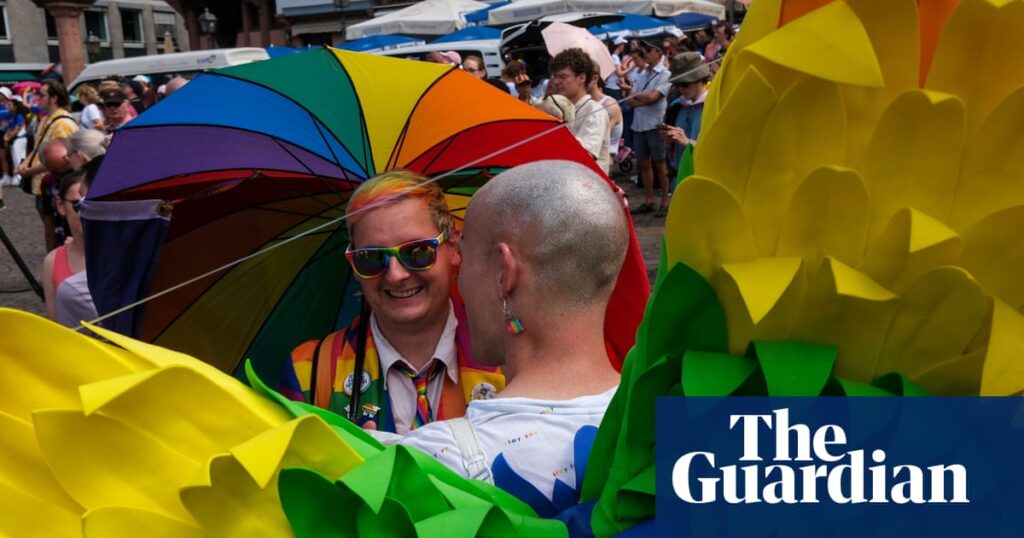The organisers of the Christopher Street Day parade in Berlin have urged participants to be vigilant amid a rise in attacks on LGBTQ+ events across Germany.
Hundreds of thousands of people are expected to take to the streets of the German capital this weekend for a loud and colourful celebration held in memory of the 1969 Stonewall riots in New York, Christopher Street being the location of the Stonewall Inn. But behind the party atmosphere there is a more sombre mood than usual as LGBTQ+ organisations warn that attacks have become more frequent.
“It has been said in recent years that Christopher Street Day had become too big, too commercialised, too apolitical,” said one of the organisers, Thomas Hoffmann. “But now it’s time for us to be louder than ever and for people to come out in large numbers when we’re losing rights for which we have fought for decades.”
At stake, he said, was nothing less than societal tolerance across the board, which was being tested “first and foremost on us as we’re most visible”.
Campaigners say a rise in hostility has accompanied the increase in support for the far-right Alternative für Deutschland (AfD) party, which came second in February’s elections and is now the biggest opposition party in the German parliament.
Lorenz Blumenthaler, a spokesperson for the Antonio Amadeu Foundation which campaigns against rightwing extremism, racism and antisemitism, said there had been 55 rightwing extremist attacks at Pride parades across Germany last year.
The organisation had already recorded 30 attacks “with a rightwing extremist background” on Christopher Street Day parades in Germany so far this year, he said. There are about 120 parades due to take place this year.
“It was last year we noticed that rightwing extremist mobilisation against Pride celebrations was increasing massively,” he said.
The attacks on Christopher Street Day celebrations, he said, ranged from “traditional verbal insults to physical assaults, including people being doused with boiling water for walking under buildings as part of the Pride parade”.
With the campaign platform Campact, a German NGO, the foundation has established a €100,000 (£87,000) fund to support Christopher Street Day parades, particularly those in eastern Germany. The AfD is high in the polls there and there was an increasingly aggressive opposition to gay rights, Blumenthaler said.
Bastian Finke, the head of Maneo, a Berlin project that documents cases of homophobic violence, said the parades had increasingly become targets in the last year. While the events in cities such as Cologne and Berlin had not been specifically threatened, it was those in smaller towns and rural areas that were most at risk and harder to police, he said.
after newsletter promotion
Danjel Zarte, who owns the Das Hoven cafe, a popular meeting point for the LGBTQ+ community in the Neukölln district of southern Berlin, said the hatred had become a daily challenge. He has filed 45 police complaints in the last 18 months, all connected to homophobic attacks.
On top of the psychological burden, it was also threatening the existence of his cafe as guests were staying away out of fear, he said. “We are constantly verbally abused. People spit at the windows, or throw dog shit at them. A fire extinguisher was thrown through the window of our office, staff have been physically attacked or had the windscreen wipers torn off their cars. I constantly ask myself how long I can continue.”
Blumenthaler said analysis of the increased hostility often focused on the influence of Donald Trump in emboldening conservatives and rightwingers globally, but “the fact is homophobia has always been central to [German] rightwing extremist mobilisation”.
He added: “It’s not an import; it’s in our midst.”
Finke of Maneo said there were almost no Pride celebrations in Germany any more that didn’t trigger some kind of rightwing extremist demonstration, whether by small or large groups. At the same time, he said, the organisation had also seen an increase in Islamist-inspired attacks by “people who, out of a misunderstood interpretation of their religion, feel compelled to punish people for who they are”.
This weekend’s parade has adopted the slogan “Never be silent again!” in a clear reminder of the Nazi era when hundreds of thousands of gay people were rounded up. The numbers were particularly high in Berlin, where a nascent gay rights movement in the 1920s was crushed by the Nazis.
Christopher Street Day organisers say Friedrich Merz’s new government is contributing to the atmosphere of fear by engaging in dog-whistle politics to win voters back from the AfD. Julia Klöckner, the parliamentary president from Merz’s centre-right CDU, drew criticism when she said that, unlike in recent years, the rainbow flag would not be hoisted on the parliament building for the Berlin parade.
“We are the German parliament, and we fly one flag: black, red and gold,” she said, alluding to the German flag. “It represents everything our basic law stands for: freedom, human dignity and also the right to sexual self-determination. No flag flies above it.”
Merz said he agreed with her decision, stating: “The Bundestag is not a circus tent.”


